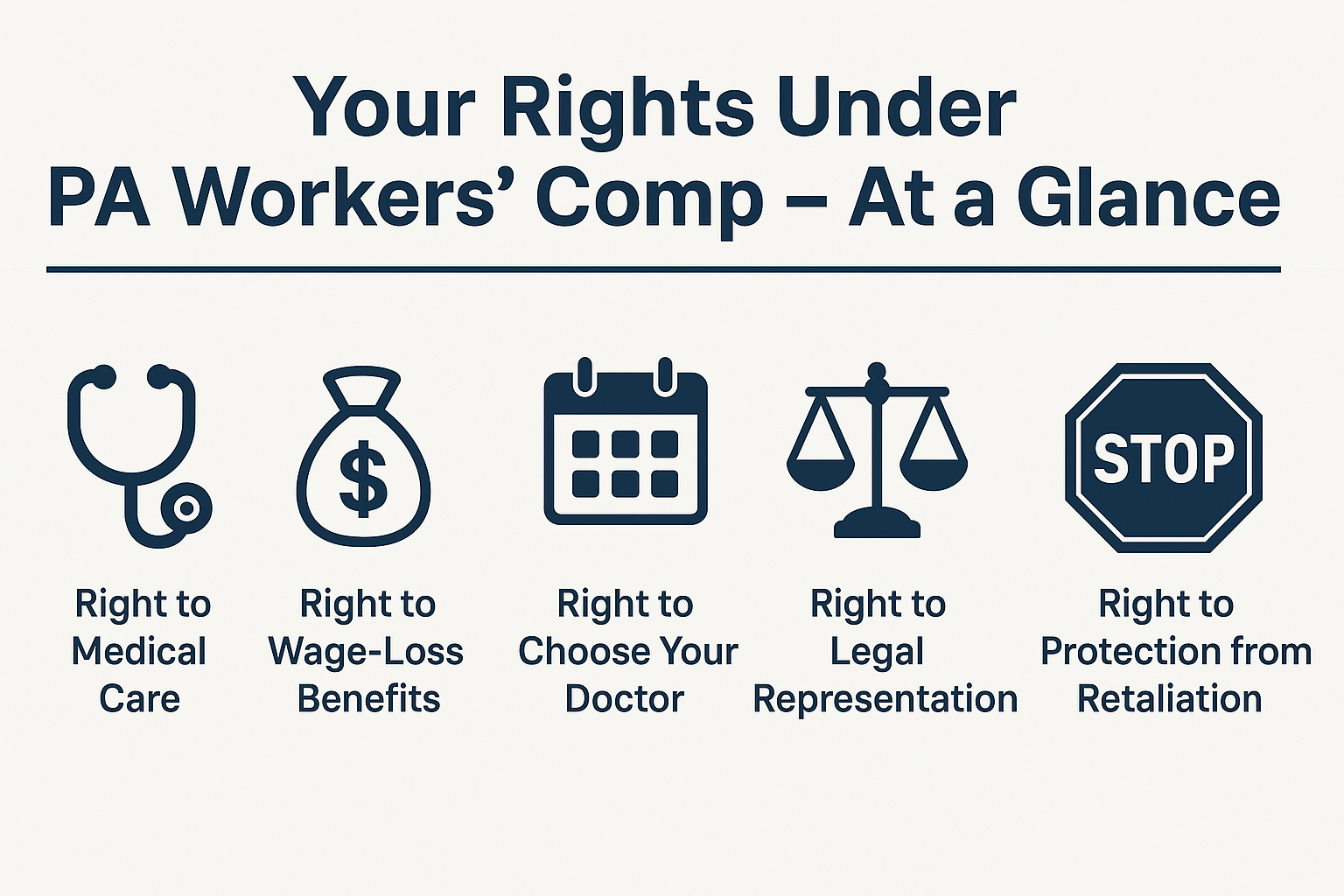Understanding Your Rights Under Pennsylvania Workers’ Compensation Law
If you were injured at work in Pennsylvania, you’re probably dealing with pain, paperwork, and uncertainty. You may not know your rights or what steps to take next.
The Pennsylvania workers’ compensation system exists to protect you. But that doesn’t mean it’s easy to understand or navigate.
At Selingo Guagliardo, we’ve helped injured workers across Northeastern Pennsylvania get the support they deserve. Our team knows how to deal with employers, insurance companies, and the legal process when a workplace injury turns your life upside down.
What Is Pennsylvania Workers’ Compensation?
Workers’ compensation is insurance that covers employees who are injured or sick due to their jobs.
In Pennsylvania, this system is no-fault. That means you don’t have to prove your employer did anything wrong. You're likely eligible for benefits if your injury happened at work or because of your job duties.
These benefits can include:
Medical treatment
Partial wage replacement
Specific payments for permanent injuries
Death benefits for surviving dependents
Most employers in Pennsylvania are legally required to carry workers’ compensation insurance. That coverage starts on your first day of work, whether you’re part-time or seasonal.
In exchange for these benefits, you usually can’t sue your employer for a work-related injury. Workers’ comp is the exclusive way to get support after a workplace injury.
It’s a system designed to move quickly and avoid drawn-out lawsuits, but it doesn’t always work that way in practice. Knowing your rights becomes critical.
Your Rights as an Injured Worker in Pennsylvania
Pennsylvania law gives you specific rights if you’re hurt on the job. These protections help you recover, stay financially stable, and avoid unfair treatment.
Right to Medical Care
You have the right to receive all medical treatment for your work injury. This includes hospital visits, surgery, prescriptions, physical therapy, and more. There are no deductibles or co-pays; your employer’s workers’ comp insurance covers it.
Right to Wage-Loss Benefits
You're entitled to partial wage replacement if you can’t work because of your injury. The amount is based on your average weekly wage and is meant to help you stay afloat while you recover.
Right to Choose a Doctor (After 90 Days)
If your employer has a list of approved doctors, you must choose from that list for the first 90 days. After that, you can switch to any doctor if they’re correctly licensed. Emergency care is always your choice, no matter when it happens.
Right to a Safe Workplace
You have the right to a reasonably safe work environment. Employers must follow safety regulations to prevent injuries and illnesses on the job.
Right to Protection from Retaliation
Your employer cannot legally fire, demote, or harass you for filing a workers’ compensation claim. You may have a separate legal claim if you believe you’ve been targeted for exercising your rights.
Right to Legal Counsel
You can hire a lawyer at any point in your claim. You usually pay no upfront legal fees from your settlement or awarded benefits if your case is successful.
Knowing these rights puts you in a stronger position to protect yourself, your income, and your recovery.
How to File a Workers’ Compensation Claim in PA
Filing a claim isn’t complicated, but it does require action, and deadlines matter. Here’s how to protect your rights and keep your claim on track.
Step-by-Step Process
Report the Injury
Tell your employer as soon as possible. You have 120 days to report a work injury under Pennsylvania law. If you report it within 21 days, you may receive backpay from the date of injury.Get Medical Treatment
If your employer gave you a list of approved doctors, you must use that list for the first 90 days. After that, you can see any provider. In an emergency, go wherever you need care. No restrictions apply.Employer Notifies Insurer
Once you report the injury, your employer should notify their insurance company. The insurer has 21 days to accept or deny your claim.Approval or Denial
If approved, you’ll start receiving benefits. If denied, you’ll get a written notice. At that point, you have the right to appeal.
Timelines Matter
21 days: Report early to receive full backpay
90 days: Employer can control doctor choice
120 days: Deadline to report the injury
3 years: Limit to file a formal claim petition if denied
Tips to Avoid Delays or Denials
Report the injury in writing
Get medical care right away
Follow all treatment instructions
Keep copies of everything
Don’t downplay your injury
Consult a lawyer if anything seems off
Small mistakes can cause major setbacks. Stick to the process, meet the deadlines, and don’t assume your employer or insurer will handle everything for you.
Types of Workers’ Compensation Benefits in PA
Pennsylvania workers’ compensation provides different types of benefits depending on the nature and severity of your injury.
Medical Expenses
You’re entitled to full coverage for reasonable and necessary medical treatment related to your work injury. This includes hospital visits, surgery, prescriptions, physical therapy, and medical equipment. There are no out-of-pocket costs when care follows the rules.
Total and Partial Disability Benefits
If you can’t work, you may receive total disability benefits, typically two-thirds of your average weekly wage, up to a set maximum.
If you return to work in a reduced capacity or earn less because of your injury, you may qualify for partial disability benefits, which cover two-thirds of the difference between your old and new wages. Partial benefits are available for up to 500 weeks.
Specific Loss Payments
You may qualify for a lump-sum payment if you lose a body part, lose the use of a body part, or suffer serious disfigurement to your head, face, or neck. These payments are set by law and awarded even if you don’t miss time from work.
Death Benefits
If a work-related injury results in death, the worker’s spouse and dependents may receive wage-loss benefits and coverage for funeral costs up to a legal limit.
Each benefit comes with specific rules. Knowing what’s available can help you avoid missed compensation.
What to Do If Your Claim Is Denied or Benefits Are Reduced
A denied claim or sudden cut in benefits doesn’t mean you’re out of options. Pennsylvania law gives you a clear path to challenge these decisions.
Reasons for Denial
Claims often get denied for reasons like:
Missing medical records
Disputes over whether the injury is work-related
Delayed injury reports
Allegations of pre-existing conditions
Insurers may also claim you didn’t follow proper procedures. The right documentation can challenge these reasons.
How to Appeal
You can file a Claim Petition with the Bureau of Workers’ Compensation if you receive a denial. This starts a legal process where a judge will hear your case. You’ll need medical evidence and possibly witness testimony. Most people benefit from having a lawyer at this stage.
You typically have up to three years from the date of the injury to file, but acting sooner can help your case.
IMEs and Benefit Modification
The insurer may request an Independent Medical Examination (IME). These exams often favor the insurance company. If the IME claims you can work, the insurer might try to reduce or stop your payments.
You can challenge any attempt to modify or end your benefits. Your treating doctor’s opinion can carry more weight, especially when backed by consistent records.
Common Employer/Insurer Tactics
Watch for these red flags:
Pressure to return to work too soon
Light-duty offers that don’t match your restrictions
Claims that your injury isn’t job-related
Delays in sending checks or covering treatment
If something feels off, get legal advice. The sooner you act, the easier it is to protect your rights.
Why Local Experience Matters: Northeastern PA Representation
When dealing with a work injury, having a lawyer who knows the local system makes a real difference. At Selingo Guagliardo, we’ve spent decades representing injured workers across Northeastern Pennsylvania.
We know the doctors, employers, and insurance companies in this region. We understand how certain employers handle claims and which doctors tend to favor insurers in IMEs. That kind of insight helps us anticipate problems before they happen.
We also know the judges who decide workers’ compensation cases in this area. Every judge has a different style, and knowing what to expect helps us prepare your case more effectively.
Most of all, we know the communities we serve. Whether you work in a Wilkes-Barre warehouse, Scranton hospital, or Hazleton factory, we’ve likely handled cases like yours.
You don’t need a big-city firm that treats you like a case number. You need a local team that shows up, answers your questions, and knows how to win cases in Northeastern PA.
Free Case Evaluation
You don’t have to figure it out if you've been injured at work. Pennsylvania's workers’ compensation system can be confusing; even a tiny mistake can delay or reduce your benefits.
At Selingo Guagliardo, we help injured workers across Northeastern PA get the medical care and wage support they deserve. Our team handles the paperwork, the insurers, and the legal process so you can focus on healing.
You won’t pay anything upfront. We only get paid if we recover benefits for you.
There’s no pressure—just answers.
Click below to schedule your free case evaluation and get straightforward advice from a local attorney who handles workers’ comp claims in Pennsylvania.
Workers Compensation Frequently Asked Questions (FAQs)
-
Any injury or illness caused or made worse by your job may be covered, including sudden accidents, repetitive strain injuries, and work-related illnesses.
-
You must report the injury within 120 days, but reporting within 21 days can help you get full wage-loss benefits from the start.
-
Yes, but only after 90 days if your employer-provided a list of approved doctors. Before then, you must use a provider from their list.
-
You can file a Claim Petition with the Bureau of Workers’ Compensation. A judge will review the case. Many injured workers get help from an attorney at this stage.
-
No. Retaliation for filing a workers’ compensation claim is illegal. If you’re fired or harassed for exercising your rights, you may have a separate legal claim.


